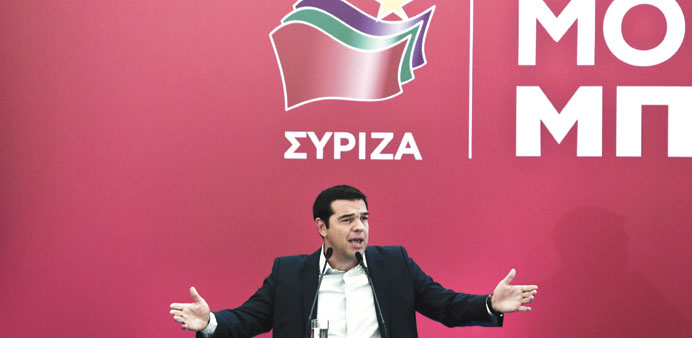AFP/Reuters
Athens
Greece’s former prime minister Alexis Tsipras called yesterday for voters in upcoming snap elections to give his radical left Syriza party a “strong mandate” to lead the crisis-hit nation.
Tsipras, who rode to power in January on a wave of popular anger over austerity, is seeking re-election in September 20 polls to implement more painful reforms demanded under a new €86bn ($96bn) international rescue package.
“We are seeking a strong mandate, an absolute majority for the Syriza government” for the next four years, he said in an interview with Realnews.
Tsipras said that it was time to exit the two-party paradigm that has seen Greece alternate between the conservative opposition New Democracy party and the Pasok socialist party for the past four decades.
“It’s crucial to not take a step back but to move forward,” he added.
But Greek pollsters give Syriza a lead of only between one and three and a half points over its chief adversary New Democracy, making an absolute majority unlikely.
If the polls are borne out, Tsipras would have to form a coalition government.
Only one poll, carried out by the Bridging Europe think tank, gives the party a clear advantage of eight points.
Tsipras has ruled out forming a national unity government should he fail to win outright majority, saying that he could not work with New Democracy, Pasok or the centre-right Potami.
He stepped down on August 20 and called for a fresh vote – the fifth in the country in six years – after suffering a major rebellion in his hard-left party over Greece’s huge new international bailout.
Dozens of Syriza lawmakers rejected Tsipras’ decision to accept further austerity measures to prevent Greece crashing out of the eurozone, accusing him of capitulating to creditors’ “blackmail”.
Hours after Tsipras resigned 10 days ago, a group of far-left rebels broke off and formed Popular Unity, a new party which polls suggest will enter parliament.
Underscoring his troubles, some members of Syriza’s moderate factions have also resigned or said they will not run in the elections.
“We do not regret having fought nor having chosen at the end to avoid catastrophe,” Tsipras told a gathering of the party’s central committee. “Whoever wants to escape has the right to do so but we are moving forward.”
When Tsipras was asked during the Realnews interview why he has not apologised to the Greek people for changing his stance on austerity he replied: “Why should I ask their forgiveness?”
“I fought with all my heart to remain faithful to the mandate given by the Greek people” who wanted to stay in the eurozone, he said.
The past eight months since Syriza came to power have been a rollercoaster ride for the troubled Greek economy.
After talks broke down in June between Athens and international lenders, and Greeks rejected creditors’ tough bailout terms in a referendum, the European Central Bank restricted its assistance to Greek banks, forcing the government to shut them down and impose capital controls to avert a run on deposits.
Tsipras has said that he does not believe in the agreement he finally struck with the creditors, but saw it as the only way of keeping his country in the single currency.
Syriza’s election programme calls for restructuring in the agricultural sector, reinforcement of the banking system, job protection and a stepped-up battle against corruption.
It is also seeking a restructuring of the country’s mountain of debt, which amounts to some 170% of gross national product.
Syriza’s campaign programme pledges to battle creditors on some areas still up for discussion if it is re-elected.
“Syriza’s government will implement these commitments but it is determined to find measures that will offset and minimise their negative impact and negotiate in a tough manner the parts of the agreement which remain open,” the party’s plan said.
It reiterates promises to fight corruption and tax evasion and reform the state, pledges on which Syriza was first propelled to power in January.
Its supporters have criticised it for lack of progress which it blames on painstaking negotiations with its European Union and International Monetary Fund lenders.
The party pledged to negotiate what it calls a “grey zone” of labour and pension reforms and privatisations, seeking to win over a big pool of undecided voters and to appease disgruntled members.

Tsipras: We are seeking a strong mandate, an absolute majority for the Syriza government.
